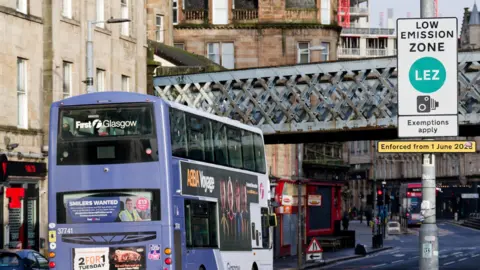Scotland's emission cuts 'too slow' despite fall
 Getty Images
Getty ImagesCuts to Scotland's planet-warming greenhouse gases are still "too slow" despite a fall in emissions, environmental groups say.
They say progress has "stalled" after figures showed a 1.9% year-on-year drop in emissions such as carbon dioxide for 2023.
A bounce back in international air travel after the pandemic has largely offset reductions elsewhere, with domestic transport still the single biggest source of emissions.
The Scottish government insists significant actions have been taken over the last two years to bring emissions down further.
While many sectors have seen modest falls, emissions from overseas flights grew 19%.
It means emissions have now been cut by 51.3% since the baseline year of 1990, although the Scottish government no longer has annual targets against which the figures are measured.
The biggest reduction came from the electricity sector which has been shifting to renewables, principally onshore and offshore wind.
A big cut in generation from Scotland's only gas-fired power station, at Peterhead, saw the sector's emissions fall by 44%.
Emissions from domestic transport are the largest emitting area, responsible for 29% of the total.
Scotland's first low emission zone began operating in Glasgow half way through the year.
Emissions from agriculture are broadly unchanged, although the industry is now only the third most emitting sector.
It has been replaced in second place by heating in buildings.
Emissions from fuel production and distribution have dropped by 13%.
Acting Net-Zero Secretary Gillian Martin said the figures showed that Scotland was leading the rest of the UK in cutting emissions.
"Net zero offers huge economic opportunities for our country and the changes we need to make will put money into people's pockets, improve health and wellbeing and create better public services as well as protect our planet for future generations," she said.
Missed targets
WWF Scotland said progress was still "too slow" and that the reductions "are simply not enough."
Head of policy Claire Daly said: "Emissions from transport, buildings and agriculture remain largely unchanged and far too high. Every year of inaction makes the path to a safer, fairer future even harder to reach."
The concerns are echoed by the Institute for Public Policy Research (IPPR) which said progress had stalled.
Research fellow Dave Hawkey said: "The parliament's recognition of a climate emergency in 2019 was not matched by a step change in policy. Instead, timid piecemeal initiatives crowded out more ambitious ideas."
These figures have historically been an important benchmark for how well Scotland is doing in reducing its impact on climate change.
But the Scottish government missed nine of the last 13 targets and eventually decided to scrap them.
It means that Scotland is currently without any interim targets for cutting emissions until it legislates to replace them with five-yearly carbon budgets.
The long-term goal, to reach net zero by 2045, remains in place.
Net zero is the point where no more greenhouse gases are being added to the total in the atmosphere.
'Empty slogan'
Douglas Lumsden, the Scottish Conservative Party's energy and net zero spokesman, said: "Nationalist ministers love to boast that they are world-leading on this issue, but they can't even meet their own emissions targets and their sheer incompetence forced them to dump them all altogether.
"We all want to address climate change, but the truth is net zero is just another empty slogan for the SNP."
He added: "Reaching net zero by 2045 is not affordable for the public. That's why the Scottish Conservatives are calling for an affordable transition that keeps bills low for businesses and consumers."
Scottish Labour's net zero spokesperson Sarah Boyack said: "The SNP's record on the environment is one of grand promises and woeful delivery.
"It's clear more must be done to drive down emissions in Scotland and do so in a way that delivers lower bills for struggling Scots and creates good quality green jobs.
"The SNP's failure to plant trees and restore peatland at the rate needed means our land is not operating as a carbon sink."
